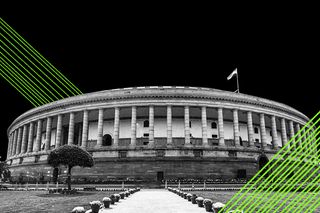
Only 0.3% of Parliament Questions in the Last 20 Years Were About Climate Change: Study
There would be greater climate awareness and action “if politicians from vulnerable states or those representing vulnerable groups asked more questions.”

Between 1999 and 2019, only three in every 1,000 questions raised in India’s parliament referenced climate change, making it an inadequately discussed subject at a governance level. A majority of these pertained to agriculture and coastal flooding, overlooking the intersectional impact of climate change — such as its impact on health, gender, housing — that is intertwined with equity and human rights concerns. These are the findings of a new study, revealing a missing link in governmental deliberations about climate concerns.
The premise of the study lies in the power India’s democratic institutions hold. The Question Hour, the first hour of a Lok Sabha sitting session where Members of Parliament raise questionsabout any aspect of administrative activity, is a powerful oversight tool for the country. It is the sign of a well-functioning democracy; the questions asked simultaneously articulate the grievances, concerns, and aspirations of millions of Indians, through the representatives they elect.
“Extreme events like floods or heat waves seem to be becoming more frequent very quickly, and we need a scaling up of climate action plans, especially climate adaptation plans. More than climate denialism, people seem to be climate-blind, not seeing the urgency and intensity of the threat,” Harini Nagendra and Seema Mundoli, co-authors of the present study, told The Swaddle. “For this, a greater focus on climate change discussion in the House of Parliament will certainly help.”
The way concerns about the climate crisis are reflected in the Indian parliament will decide its weightage in the national agenda, further molding India’s climate change policy and giving it shape. India can’t analyze and adapt its stance on the climate crisis — much less develop informed answers to the several consequences — if political representatives don’t raise questions.
To understand how the crisis is represented in the Parliament, the researchers examined the parliamentary questions pertaining to climate change between 1999 and 2019 — roughly 895 questions. They looked at the frequency of climate change questions; what kind of questions were asked; where parliamentarians got their information on climate change from; if the interests of people most vulnerable to climate change were represented. The study was published in the journal Environmental Research: Climate.
Largely, the Question Hour as a parliamentary oversight is “severely under-utilized,” the study concluded. It made two things clear. One, not enough questions are being asked about climate change. To put this in perspective: over a 20-year period, only 0.3% of the total questions asked were related to climate change. Interestingly, the 895 questions asked since 1999 were asked by MPs who weren’t from vulnerable states, such as Meghalaya or Mizoram. “Despite the fact that climate impacts are largely local, our findings indicate that MP from the most climate vulnerable states are not asking questions on climate change,” the study noted.
Related on The Swaddle:
How a Robust Climate Education Curriculum Can Address Young Adults’ Eco‑Anxiety
The frequency of questions increased significantly first in 2007 and then in 2015, aligning with landmark developments in Indian policy. In 2007, questions pertained to the National Action Plan on Climate Change (NAPCC) which was to be launched the followingyear; in 2015, the “Ministry of Environment and Forests” was renamed “Ministry of Environment Forests and Climate Change.” External political developments drove much of the interest in and around climate change.
Two, while the number of questions increased over time — a reasonable result of rising extreme weather disasters — there were certain gaps in representation. Most questions pertained to vulnerable sectors like agriculture and coastal flooding – evidently because they representthe more tangible impact of changing climate. For instance, agriculture is of importance to parliamentarians whose constituents live in rural India — which accounts for almost 69% of Indians.
But this also means that climate change is still perceived, at least in terms of governance, as a specific, technical issue that is limited to “disasters” in its impact. But climate change is in itself incredibly complex – it affects our health, cities, safety, livelihoods. Social, cultural, and equity aspects of climate change — such as how extreme weather events impact instances of gender-based violence — were thus likely to be absent from parliamentary discussions, further restricting meaningful change.
“There is enough evidence now to show that climate change has a very differential impact on marginalized groups,” say Mundoli and Nagendra. “Some states are more vulnerable than others (coastal states, states prone to flooding and drought, states in mountainous regions), as are some types of livelihoods (agriculture, fishing, forest harvesting), and some groups (women, children, and the elderly). It would certainly increase awareness among people if MPs from vulnerable states or otherwise representing or interested in specific vulnerable groups asked more questions.”
Related on The Swaddle:
Why We Keep Ignoring Crisis Warnings
The research also presents an interesting avenue for democratic institutions to cultivate climate awareness. When the ministers of parliament did raise questions, the majority of times they quoted studies, and others, they cited media articles. According to the researchers, “the media has a very critical role in taking issues of climate change to the MPs. Well-researched, lucid articles that combine data and human narratives, and simplify the technical complexity of climate change without losing its human touch, can make a huge difference.
“It would also help if media reach out specifically to MPs from the regions where these articles are being written, to ask them for their opinions, to share details of issues being sidelined in their constituencies, and to know what is being planned. Consistent analytical reporting by media – English and vernacular – can be a very influential changemaker for improving climate change awareness in India,” Mundoli and Nagendra note.
The research speaks to the level of awareness and willingness to act within the Indian parliament. Holding our politicians to higher standards would mean urging them to ask more informed questions about the state of affairs in vulnerable states, and take targeted action to protect marginalized groups.
“Climate adaptation is urgently required in India, and yet remains relatively under-discussed,” the researchers say. “We do see an increase in all of these lines of questioning over time, but that needs to be commensurate with the scale of the climate crisis looming in our future.”
Saumya Kalia is an Associate Editor at The Swaddle. Her journalism and writing explore issues of social justice, digital sub-cultures, media ecosystem, literature, and memory as they cut across socio-cultural periods. You can reach her at @Saumya_Kalia.
Related


Identifying Climate Villains Has Become Mainstream — But It Isn’t Enough
